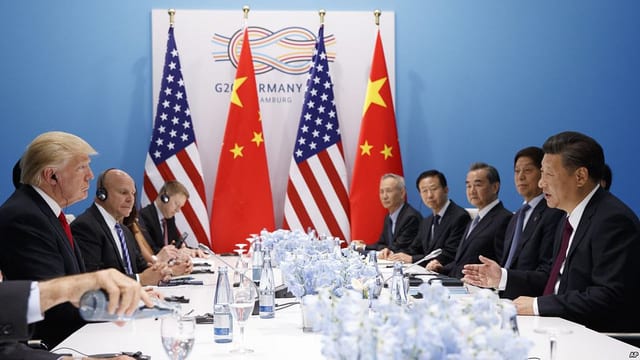 Image courtesy of 禁书 网 on Flickr
Image courtesy of 禁书 网 on Flickr
China & Russia Partnership: A Threat to Global American Dominance
The current Sino-U.S. trade war and military aggression in the South China Sea paints an uncertain picture for future relations between the two countries. At the same time, Russia and China have increased the sale of advanced military technology, a collaboration unnerving to the U.S. A Bloomberg article discussed the recent relations improvements between China and Russia as the result of U.S. foreign policy toward China. The newfound partnership seems to be one made from convenience rather than necessity; however, the two powers’ international disagreements with the U.S. have bolstered a new era of military and economic cooperation. This “Axis of Oligarchs” seeks to disrupt the current US dominated world order, and presents a partnership that supports and appreciates authoritarianism.
In the 1970s, the Nixon-Mao relationship was forged from a multitude of geopolitical issues. Vietnam, South Asia, and Korea, were among them, however, the resistance to Soviet expansionism was one of the top issues fostering a positive U.S.-China relationship. Since Nixon’s 1972 trip to China, the U.S. economy has acted as an economic anchor for U.S.-China relations, spurring over $500 Billion in trade and investment between them. The current U.S. Administration’s trade war with China has increased strain on the relationship. In the coming years, economic friction between the U.S. and China could promote a challenge to smooth relations between the two economic powerhouses, and further strengthen the relationship between China and Russia.
Last year, bilateral trade between Russia and China was up 20 percent exceeding $100 billion, making Russia China’s largest supplier of crude oil. Senior Associate Professor Stephen Nagy of the International Christian University, based in Tokyo, outlines the relationship between Russia and China as being a retaliatory response to U.S.-China Policy:
“China is feeling the heat, so by strengthening relations with Russia, stressing comradeship between Xi Jinping and Vladimir Putin, the growing economic and military tie — this is a way to send a message to the United States that China does have options and Russia is a powerful option that can provide energy resources as well… Before we didn’t have much of a trade relationship between the two states. This is an important indicator that both states see each other as important partners.”
He also notes that such a dramatic economic shift in the relationship between both countries is tempered by an even larger military one.
For decades, Russia had resisted selling its most advanced military equipment to China. However, top-grade military technology such as one of the most advanced anti-aircraft systems ever created, the s-400 Triumph interceptor-based Air Defense System, is being sold by Russia to China. In the South China Sea, China has created military installations throughout the region, provoking several of its southern neighbors and U.S. Navy patrol ships in the area. This provocation and military build-up is a part of Chinese strategy in the region. As Professor Stephen Nagy explains:
“We are not going to see China push back directly against the United States, but it will build capabilities and capacities with countries like Russia that can contribute to its social and economic stability and the ability of both to push back indirectly against the U.S.”
In the long-term, Russia may have more to fear from China than the U.S. but for now, the China-Russia union is their best way to confront the U.S. without leading to direct conflict.
Looking back on history, a crucial part of U.S. Cold War strategy included opening China’s economy to the world. This fostered a relationship that made it possible for the two powers to strengthen their political ties and limit the economic options of the Soviet Union until its collapse 20 years later. Today, Henry Kissinger has advised President Trump to peruse a “reverse Nixon-China strategy” by be-friending Moscow to isolate Beijing. While there may be some legitimacy to this idea, it is unlikely that Russia can be a reliable partner for this purpose. Rather, finding new ways to inhibit the economic and military ties between China and Russia may be the best path forward.





